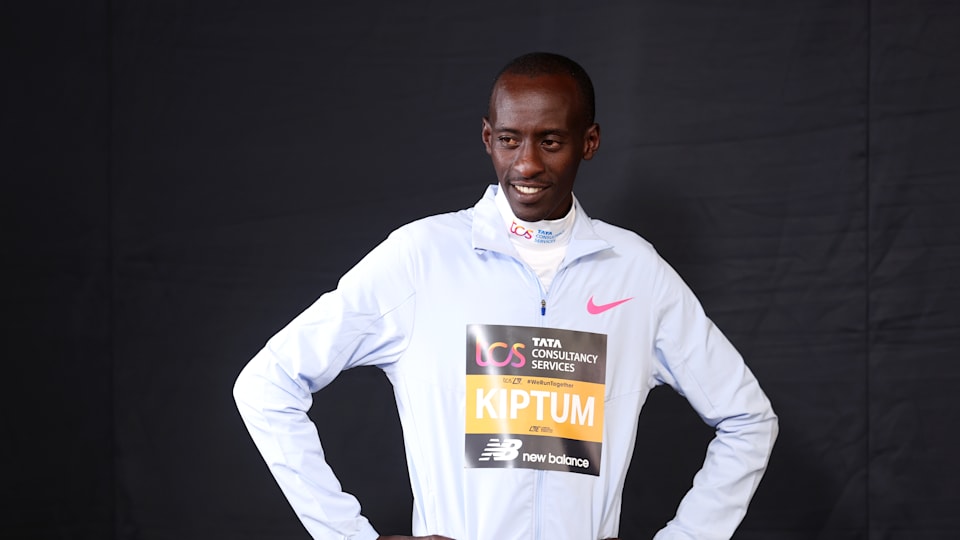
“All he does is run, eat, sleep,” Kelvin Kiptum’s coach Gervais Hakizimana says of the new marathon world record holder.
It’s a fascinating insight into the lifestyle of the Kenyan runner who shattered Eliud Kipchoge’s best mark by 34 seconds at the recent 2023 Chicago Marathon.
Of course, training, nutrition and sleep are the cornerstones of most marathoner’s daily routines. But the almost obsessive nature of Kiptum’s regime even has his coach worried that he may just be taking on too much.
“He’s very strong. He does all the training properly. He’s in his best years but at some point, I’m afraid he’ll get injured,” Hakizimana said in an interview with AFP.
So what is the training regime that has allowed a 23-year-old with just three marathons under his belt to break the world record of a bonafide legend?
Well, according to Hakizimana, it’s all about the miles.
How many kilometres a week does Kelvin Kiptum run?
Kiptum has for the most part been a self-trained runner. However, in recent times he has taken on the services of Rwanda’s Hakizimana, himself a former runner who has been acquainted with the athlete since he was a young boy.
“I have known him since childhood when I used to train near their farm in 2009,” Hakizimana told Capital FM Kenya. “He would usually come and join me although by then he would not go the full course.
“We met again in 2015 when I was struggling with injuries and was contemplating hanging up my spikes. He asked me for advice on how to train and I would send him training programmes from my base in France where I was training other athletes.”
Since early 2023, the pair’s relationship has developed into a more formal coach-athlete bond, with Hakizimana there on the finish line in Chicago ready to greet Kiptum as he set his time of 2 hours and 35 seconds.
However, it was what the coach revealed after the race that really set tongues wagging, even more so when compared to arguably the greatest marathon runner of all time, Kipchoge.
“Every week, Eliud Kipchoge does between 180 and 220 kilometres. Kelvin Kiptum is more between 250 and 280, sometimes more than 300km. It’s an adventure.
“During the preparation for London, we spent three weeks at more than 300km. That’s a very large volume. He works a lot on endurance. When he’s training, he’s strong.”
LetsRun.com revealed even more details when outlining a typical training plan for Kiptum based on information from a transcript of AFP’s conversation with Hakizimana.
Mondays, Wednesdays and Fridays include up to 40km of running split into a morning session of 25-28km and an afternoon session of 12km.
Tuesdays are spent at the track where he takes on those oft-dreaded fartlek sessions almost universally accepted now as key to marathon performance.
Saturdays may include track or road sessions, while Thursdays and Sundays see Kiptum complete 40km - close to a full marathon - at marathon pace.
But perhaps the most telling point of all? There are no days off.
“There is no weekly rest. We rest when he gets tired. If for a month he doesn’t show signs of fatigue or pain, we continue,” Hakizimana explains.
Is this approach conventional? No. Has it been effective? Well, the results speak for themselves.
How long can Kiptum sustain this gruelling training regime?
While marathon runners are well known for using different methods in their training, with Kipchoge advocating an 80/20 regime that involves 80 per cent easy runs and 20 per cent hard, many would balk at the non-stop approach Kiptum is employing.
Many that is, including his coach.
“At this rate he risks breaking,” Hakizimana says. “I suggested he lower the pace but he doesn’t want to, he talks to me about the world record people all the time. I told him that in five years he would be done, that he must calm down to last in athletics.”
But Kiptum has made a habit in his fledgling career of going against the grain. Unlike most marathoners he has no track background, having headed straight to the longer distances. He also spent years training himself - compared to an athlete like Kipchoge who works with a coach, runs in a group, and sees the race as a team sport.
And while longevity is something impossible to predict in one of the most challenging events in athletics, there’s no denying this is one of the most exciting times - and runners - in marathon history.
Maybe it’s just time for us as fans to sit back and enjoy the moment - something Kiptum won’t be doing anytime soon.
